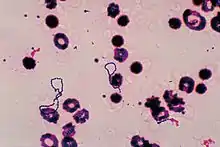Streptococcus ferus
| Streptococcus ferus | |
|---|---|
| Scientific classification | |
| Kingdom: | |
| Phylum: | |
| Class: | |
| Order: | |
| Family: | |
| Genus: | |
| Species: | S. ferus |

Overview
Streptococcus ferus is a facultatively anaerobic, gram-positive species of the genus Streptococcus.[1] The species is a member of the Viridans streptococci group [2] which are a large mixed-group of mostly alpha-hemolytic streptococci.[3] The alpha-hemolytic bacteria are ones that exhibit a partial hemolysis with green coloration when grown on sheep blood agar[4] (see image.)
Ecology
S. ferus was originally isolated from the oral cavity wild rats who were living in sugar cane fields and eating a high sucrose diet [5] The species name ferus, meaning wild, refers to their association with these animals.[5] More recently the strain has also been isolated from the nasal and oral cavities of pigs.[1] The species has not been identified in any other host organisms.
Morphology
S. ferus are gram positive lanceolate coccobacillus[1] Non-motile and approximately 0.5 micrometers in diameter.[6] They are non-sporulating and catalase-negative[1] The majority of specimens test positive for the production of acetoin (Vogues-Proskauer reaction).[5] They occur singly, in pairs or in short chains.[5]
Pathogenicity
S. ferus is commensal in wild rats and pigs and demonstrates a relatively weak cariogenic potential compared to other streptococcus species such as S. mutans[7] S. ferus has not had any reported pathogenic instances in humans.[6]
History
S. ferus was originally proposed as a species in 1977 [5]
References
- Baele M, Devriese LA, Vancanneyt M, et al. (January 2003). "Emended description of Streptococcus ferus isolated from pigs and rats". Int. J. Syst. Evol. Microbiol. 53 (Pt 1): 143–6. doi:10.1099/ijs.0.02246-0. PMID 12656166.
- "Center for Disease Control and Prevention". Retrieved 5 April 2012.
- "National Library of Medicine - Medical Subject Headings". Retrieved 11 April 2012.
- Fox, Alvin. "BACTERIOLOGY - CHAPTER TWELVE Streptococci GROUPS A, B, D AND OTHERS". Retrieved 11 April 2012.
- Vos, P.; Garrity, G.; Jones, D.; Krieg, N.R.; Ludwig, W.; Rainey, F.A.; Schleifer, K.-H.; Whitman, W.B., eds. (December 18, 2009). Bergey's Manual of Systematic Biology Volume 3. Springer. p. 692.
- "ABIS Encyclopedia". Retrieved 10 April 2012.
- Yamaguchi, Yasutaka (2008). "Cariogenicity of Three Kinds of Mutans Streptococci from Pig Oral Cavity". Int J Oral-Med Sci. 7 (2): 67–71. doi:10.5466/ijoms.7.67.